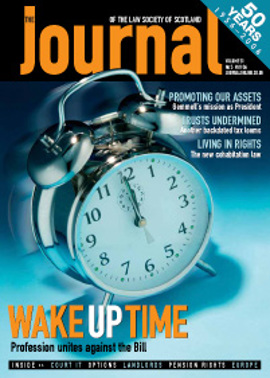Next generation law

The Adoption and Children (Scotland) Bill, published by the Executive on 28 March, seeks to “improve, modernise and extend adoption in Scotland and to provide greater stability for children who cannot live with their original families”. The bill follows on from the report of the Adoption Policy Review Group chaired by Sheriff Principal Cox, and in the main implements the Group’s recommendations.
The nature of adoption in Scotland has undoubtedly changed since the 1978 Act was drafted. The number of UK adoptions by non-relatives peaked in the late 1960s, and since then has steadily decreased: the number of Scottish adoption applications has fallen from around 1,000 per annum 20 years ago to less than 400 today. At the same time, the number of inter-country adoptions by UK adopters has gradually increased.
One reason for this is that UK adoption no longer provides babies for childless couples. In the 1960s, around 80% of adopted children were less than 12 months old at time of placement. Changes in society mean that very few infants are now available for adoption. Instead, the children who are in need of secure family homes are older, have often spent considerable time in residential care, and frequently have complex needs due to disturbed family backgrounds. The challenge for the Executive is to amend the current system to better meet the needs of these children.
This article examines three central aspects of the bill, but it should be noted that there are numerous other proposed changes to the existing legislation.
Permanence orders
The Executive has recognised that adoption in its current form, which completely severs all ties to birth parents, will not be suitable for a proportion of the 6,500 children currently in care. The bill therefore seeks to replace both freeing orders and parental responsibility orders with the new concept of “permanence orders”. These are intended to increase stability for children in situations where adoption is not an immediate option, while retaining sufficient flexibility to cope with varying circumstances.
In granting a permanence order (under clause 84 of the bill), a court will be able to allocate parental responsibilities and rights (PRRs) between the local authority, foster carers and birth parents, as it sees fit. The local authority will always have the right to determine where the child will live, but remaining PRRs can be distributed between other persons involved in the child’s care. This means that the birth parents may be able to maintain some type of parental role in the child’s life. These orders may also be used by long-term foster carers, to gain additional PRRs and so provide increased legal security for the child.
Unmarried adopters
The bill also introduces provisions to allow unmarried heterosexual or homosexual couples in an “enduring family relationship” to adopt a child jointly (clause 31). Currently, one partner can adopt as a single person, and the other partner can apply separately for an order to gain PRRs. As the review of research studies on same-sex parenting in Annex B of the Cox Report demonstrates, this is an issue on which it is difficult to take an objective viewpoint – reactions are driven by the individual’s views on marriage, homosexuality and religion. However, it might be questioned by many, who still recognise traditional marriage to be the most stable format in which to raise children, whether it is truly in the best interests of already vulnerable children to be adopted by an unmarried couple.
Dispensing with parental consent
The existing grounds for dispensing with parental consent, in section 16(2) of the 1978 Act, have been criticised as being overly complicated and difficult to apply. Clause 33 of the bill seeks to replace these with the same grounds as were introduced in England and Wales in the Adoption and Children Act 2002, so that consent may be dispensed with (i) if the parent cannot be found or is incapable of giving consent; or (ii) if the child’s welfare requires parental consent to be dispensed with. The Cox Report suggested that part (ii) of the test should be amended so that it reflects the “necessity test” in article 8 of the ECHR – that any interference in family life must be necessary to protect health or the rights and freedom of others. Therefore, consent would not be dispensed with simply because the adopters could provide a better standard of life than the birth parents. However, this is one recommendation which the Executive has not followed, adopting the English provisions word for word rather than seeking to improve on them.
It will remain to be seen whether these modernisations will truly provide greater stability for Scotland’s children in care.
Lucia Clark, Morton Fraser LLP, Family Law Team
In this issue
- Stand up to be counted
- A bill to divide us
- The pendulum swings
- The pendulum swings (1)
- Cohabitation: the new legal landscape
- The tax man cometh (again)
- The foreign legion
- Making IT happen
- Apportioning and sharing
- Property problems
- Still a profession
- Arguing over agreements
- Next generation law
- Lawyers in the transfer market
- Scottish Solicitors' Discipline Tribunal
- Landlords: setting the mark
- Website review
- Book reviews
- Purchase options in leases






